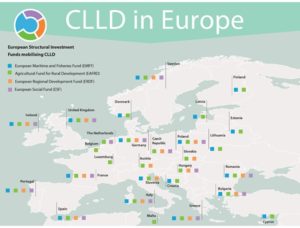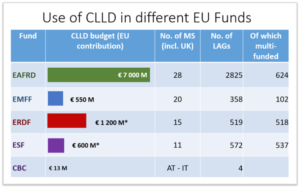
Local development has different faces across the EU. Probably its most structured form is “Community-Led Local Development” (CLLD). It was implemented initially as the LEADER approach (developed within EU rural development funding since 1991), and the last decade it can be funded also from other EU Funds: maritime and fisheries, social and regional. Designed for the rural context, it was recently extended to include also urban and coastal areas. However, it has maintained the key features of the original LEADER method, i.e. decision-making in the hands of the local community, work in partnership between public, private and civic actors and integrating different sectors and types of activities in a coherent strategy.
Of the EU-funded approaches to local development, only LEADER is mandatory; the application of CLLD under other Funds is optional. In addition, many countries have developed other forms or methods of local development, funded from a variety of sources, EU as well as national, regional and local. Thus, in each EU member state there is a specific configuration of local development approaches and funding sources, targeting various types of areas and beneficiaries and using different governance systems.

To our knowledge, no systematic study has been done of how local development is implemented in different member states. As the 2014-2020 programming period draws to an end, LDnet decided to start building a systematic repository of available information about local development, especially CLLD, across the EU. We realise we do not have full knowledge about all member states, but we decided to make a start with a few of those we know best. Our intention is to develop a basic “country profile” of each EU member state explaining its specific approach to CLLD, based on a standard template facilitating cross-country comparisons, and complemented, where possible, with information about other local development initiatives in those countries.
Several country profiles are already available (see here), and more are in preparation.
We intend to gradually expand our set of country profiles to create an open resource available to all researchers, practitioners and decision-makers interested in local development in the EU. We invite experts and practitioners to join us in this effort!
If you would like to contribute to our work by providing a description of CLLD implementation in a member state (on a standard template) or would like to supplement or correct information in an existing profile, please email: kahstefan [at] gmail.com or haris.martinos [at] gmail.com
September 2020
Acknowledgement: the images used above comes from the FARNET seminar on Implementing CLLD across the ESI Funds, Edinburgh, December 2015 and from the FARNET presentation at the Interreg session in EWRC2020, October 2020.
Leave a Reply
You must be logged in to post a comment.